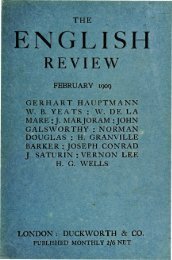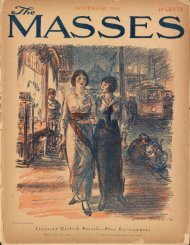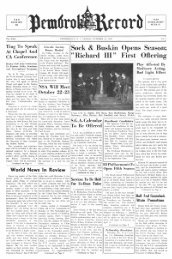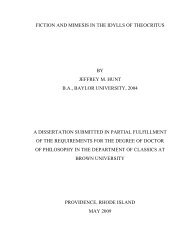View PDF - Brown University Library
View PDF - Brown University Library
View PDF - Brown University Library
- No tags were found...
Create successful ePaper yourself
Turn your PDF publications into a flip-book with our unique Google optimized e-Paper software.
118 A Recruit for Law and Orderafraid I have not got nearly as much timeto do it in as I should like. But thereare two things I want you to understandclearly in the beginning. In the firstplace, in writing that letter to Judge A.,you committed two offenses, for either ofwhich you might have been arrested. Tosend a threatening and abusive letter toany one is a violation of the law, but tosend one to a judge about a case which hehas tried, makes you liable for contemptof court as well. In that letter you accusedJudge A. several times of committinga crime; you threatened him morethan once, and you said that he tookpetty graft for deciding his cases. Thosewere not fair or decent things to write,and you must realize the seriousness ofwhat you have done. But neither JudgeA. nor myself wanted to have you arrestedwithout giving you an opportunity ofcoming here and talking the thing over.That is why I merely sent for you on asummons, which will in no way countagainst you in the future, instead of issuinga warrant for your arrest by the police.The second thing which I want to say toyou is, that I think I understand your feelingof sorrow and grief over your mother'simprisonment. Any boy with a spark ofspirit and affection would have felt terriblyabout it. Only, your sentiment,which up to a certain point did youcredit, was no justification for writingsuch a letter as that and for saying suchfalse and foolish things. By the way,Judge A. wanted me to tell you that henever had any idea that your mothercould not pay the two dollars, and thathad he known about your family he probablywould have remitted the fine altogether."Now, Harry, as I said, there is a lotI want to talk-and ask you about," andI motioned him to an adjoining chair."What do you think of the law requiringfish to be covered on the push-cart ? Doyou think it a good or a poor rule?"It would take a long time to describein detail all of our conversation thatmorning. We debated the fish law fromevery point of view, and Harry concededthat his own East Side was heartily infavor of its enforcement to protect themselvesfrom ptomaines and disease. Wediscussed the fairness of many of thepoints which he had mentioned in hisfamous letter, and even Harry had tosmile when I asked him to show me those"castles of luxury" in which he allegedwe judges lived. Then we talked of therespect and loyalty due to those who hadbeen chosen as representatives of thepeople, and I told him some stories of thestruggles which certain men in great positionshad passed through on their way tosuccess. At my request Harry told mesomething of his own hardships and ofhis efforts to gain an education. "Justto think, Judge," he said, "I had to leavehigh school in the fourth term. I don'tknow why I should have had the badluck to be cheated out of graduation.""That must have been mighty hard,"I replied, "but a good many men havesucceeded without ever having seen ahigh school. How about Abraham Lincoln?""That's right," he reflected; "I guess Ihaven't been so unlucky after all."We discussed his future plans and whatit meant to become a loyal, useful, andservice-giving citizen of this great republic,our common country.But, as we talked, I could notice all thetime a look of wonder in his face. Thequestion evidently kept constantly recurringto him: "Is this a court? Isthis the way an offender is handled?Why have I been told that people likeme have no chance for fair treatment orjustice?" Never during our interviewdid he falter or break down. Never didhe hesitate to express his own views nor,on the other hand, to acknowledge hismistakes whenever he saw that his conclusionswere wrong, but more than oncegreat tears stole down his cheeks, and Iwas glad, for they were not symbols ofgrief but rather tokens of appreciationfor the sympathy and understandingwhich had been given him.Finally, I told him that I had but onemore suggestion to offer, and that wasthat he should write a letter of apology,or of explanation at least, to Judge A."Harry," I said, "I don't want you towrite such a letter under a threat or becauseof fear of what I might do. Noletter sent under those conditions wouldbe worth the paper it was written on. Asfar as I am concerned, I am finished with










